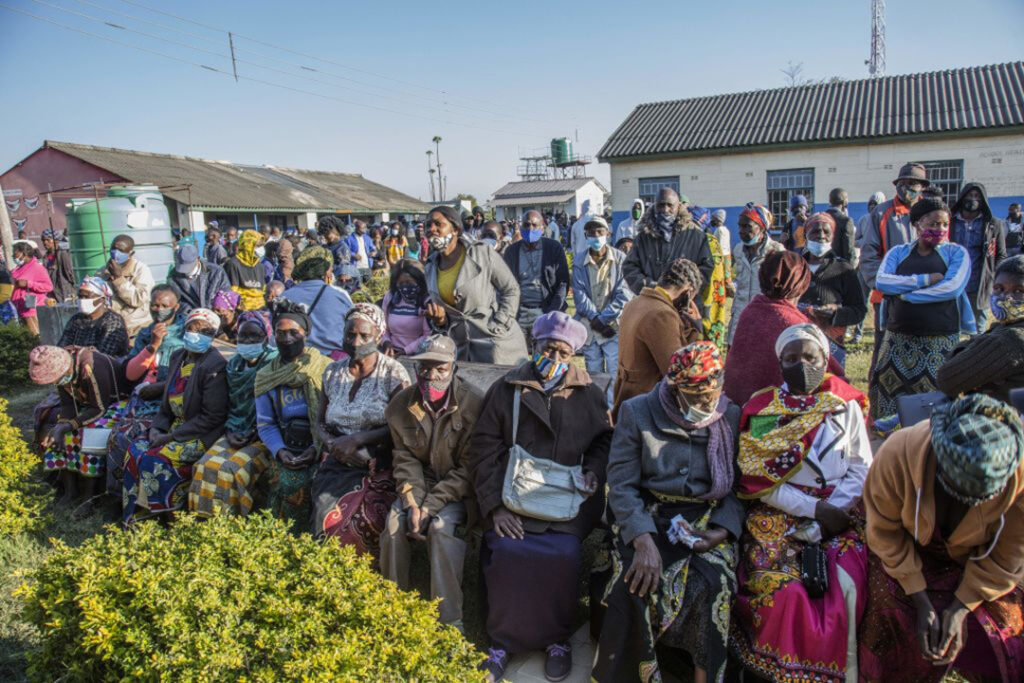ADF STAFF
To get a picture of COVID-19’s impact on Zambia, epidemiologist Dr. Lawrence Mwananyanda went to the morgue in the capital, Lusaka.
There, he tested more than 1,100 bodies over the course of three COVID-19 waves in 2020 and 2021. He found that 87% of the bodies contained the virus. For every COVID-19 death reported by a hospital, roughly four people died in their communities, away from facilities that could provide oxygen or intensive care, Mwananyanda found.
Those numbers painted a very different picture than Zambia’s official COVID-19 tally, which reports 317,000 cases and just 4,000 deaths in a country of 18 million since the pandemic began.
Mwananyanda’s study, published this year in the British Medical Journal, undermined the notion that Africa has been spared the widespread illness and deaths the pandemic has caused elsewhere in the world.
“At the beginning, the perception that COVID was missing in Africa was just wrong,” Mwananyanda, a special advisor to the president of Zambia, told ADF.
With just under 15% of the world’s population, Africa accounts for less than 5% of global COVID-19 cases. Since the COVID-19 pandemic reached Africa in March 2020, most African nations have reported significantly fewer cases and dramatically lower numbers of deaths than other parts of the world.
That experience has run counter to the original speculation that the pandemic would devastate the continent, which has just three doctors for every 100,000 people and has about one-third the number of epidemiologists it needs for a population of 1.3 billion. Further complicating matters, public health experts expected malaria, tuberculosis, HIV and malnutrition to fuel a pandemic catastrophe.
The gap between the expected outcome and African nations’ experience with COVID-19 has scientists and others perplexed: Could it be the continent’s relatively young population? Could it be the largely rural setting so many Africans live in? Could it be African nations’ experience with handling previous epidemics?
As Africa enters the pandemic’s third year, the answer appears to be “none of the above.”
The pandemic spread as quickly in Africa as it did elsewhere, Mwananyanda said. African nations simply lacked the tools to track it early on.
“When we had the resources to look for the disease, we found it,” he said.
Several factors have hindered an accurate picture of COVID-19’s impact on Africa: a lack of testing (and, therefore, a lack of reported cases), poor vital record-keeping by national and provincial governments, and a large proportion of deaths that have happened away from hospitals.
South Africa, which has the continent’s strongest public health surveillance system, has reported the continent’s largest number of COVID-19 cases and deaths since the pandemic began. Even there, studies suggest the actual death count could be as much as three times the official tally.
“I think the South Africa study is closer to what’s happening in the continent,” Mwananyanda said.
On the plus side, a World Health Organization (WHO) study suggests that as much as 65% of the continent’s population has been exposed to some form of the COVID-19 virus, providing widespread immunity. That has encouraged countries across the continent to ease restrictions on social distancing and masks in public spaces.
In spite of that, experts at the WHO and the Africa Centres for Disease Control and Prevention (Africa CDC) continue to recommend precautions to avoid spreading the virus. They also say the continent must increase its testing and sequencing to stay ahead of potentially deadly variants that experts believe are inevitable.
The Africa CDC has reported more than 103 million tests on the continent to date. Nearly a quarter of those have been done in South Africa, which has tested about 40% of its 60 million people. By comparison, Liberia has reported fewer than 140,000 tests, or less than 3% of its 5 million residents, according to the Africa CDC.
African nations report some of the lowest COVID-19 testing rates in the world, even as the WHO and Africa CDC have made rapid self-tests widely available. The goal is to encourage people to know their status and act to protect their communities if they become infected.
Without continued and consistent testing and sequencing, it’s impossible to understand how COVID-19 is progressing in Africa and elsewhere, according to WHO COVID-19 technical lead Maria Van Kerkhove.
“The pandemic is not over,” Van Kerkhove said during a recent briefing. “We are concerned with a (global) reduction in testing and a reduction in sequencing. This is compromising our ability to track this virus.”

